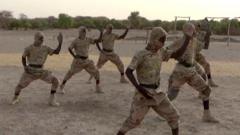In a significant political development, the United States is reportedly set to remove the Syrian Islamist group Hayat Tahrir al-Sham (HTS) from its list of foreign terrorist organizations, as detailed in a recent state department memo. This decision is notable as HTS played a pivotal role in the December offensive that led to the fall of the Assad regime, which had been in power for 54 years. The group's leader, Ahmed al-Sharaa, has ascended to the position of interim president in the newly formed government.
US to Delist Syria's HTS: A New Era for Syrian Politics

US to Delist Syria's HTS: A New Era for Syrian Politics
The United States plans to remove Hayat Tahrir al-Sham from its terrorism list, signaling a potential shift in Syrian governance dynamics.
HTS, once known as al-Nusra Front and affiliated with al-Qaeda, severed ties with the global terror group in 2016. This delisting comes amid a broader trend among Western nations to reevaluate their relationships with Syria, which has endured severe sanctions imposed during the earlier regime. President Trump recently signed an executive order to lift US sanctions to foster stability and peace in Syria, with a commitment to monitor the new government’s progress on various fronts, including relations with Israel and actions against foreign terrorist activities.
Syrian Foreign Minister Asaad al-Shibani welcomed the US’s decision, suggesting it would facilitate economic revitalization and reengagement with the global community. Furthermore, Syria has expressed readiness to cooperate with the US regarding a 1974 disengagement agreement with Israel.
Adding to these diplomatic activities, UK Foreign Secretary David Lammy made a historic visit to Syria, the first by a British official since the uprising in 2011. During his meetings with al-Sharaa, he announced a £94.5 million support initiative to aid long-term recovery and assistance to Syrian refugees. Notably, while sanctions targeting Syria’s defense and interior ministries have been lifted, the humanitarian situation remains dire, with approximately 90% of the populace living below the poverty line post-conflict.
Amid promises of a renewed Syria from al-Sharaa, there are rising concerns regarding the new government’s operations and its historical context. So far, only one woman has been appointed to the cabinet, and al-Sharaa has made most government appointments independently. The situation has also been marred by violence against minority groups, raising alarm over the security and stability of the new regime.
These developments reflect a complex web of hope and concern as Syria navigates its post-war landscape and seeks to forge a path forward amidst international scrutiny and internal challenges.
Syrian Foreign Minister Asaad al-Shibani welcomed the US’s decision, suggesting it would facilitate economic revitalization and reengagement with the global community. Furthermore, Syria has expressed readiness to cooperate with the US regarding a 1974 disengagement agreement with Israel.
Adding to these diplomatic activities, UK Foreign Secretary David Lammy made a historic visit to Syria, the first by a British official since the uprising in 2011. During his meetings with al-Sharaa, he announced a £94.5 million support initiative to aid long-term recovery and assistance to Syrian refugees. Notably, while sanctions targeting Syria’s defense and interior ministries have been lifted, the humanitarian situation remains dire, with approximately 90% of the populace living below the poverty line post-conflict.
Amid promises of a renewed Syria from al-Sharaa, there are rising concerns regarding the new government’s operations and its historical context. So far, only one woman has been appointed to the cabinet, and al-Sharaa has made most government appointments independently. The situation has also been marred by violence against minority groups, raising alarm over the security and stability of the new regime.
These developments reflect a complex web of hope and concern as Syria navigates its post-war landscape and seeks to forge a path forward amidst international scrutiny and internal challenges.





















